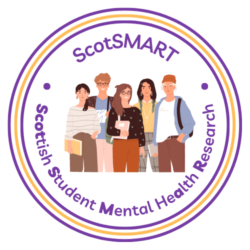Author: Victoria Mooney
On the 16th of April, The Second Annual ScotSMART conference was hosted in-person and online by the University of Edinburgh Business School. Attendees were predominately individuals working within and in coalition with student support services within the Scottish Higher Education Sector. The Conference proceedings included ScotSMART working group presentations, a keynote speech by Julie Cameron (Associate Director of Mental Health Foundation), panel discussions and networking opportunities. I was present as a part of the Intervention Working Group and as a member of the Panel discussion on student mental health interventions.
ScotSMART Working Group Presentations
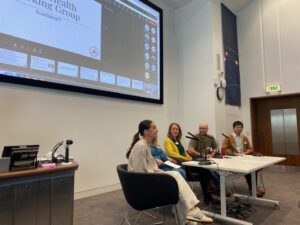
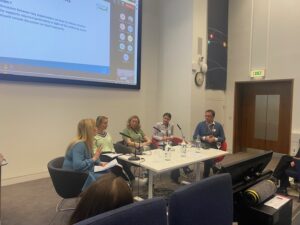
The Interventions Working Group first presented their preliminary findings on the “Student Mental Health and Wellbeing Interventions in Scotland,” focused on analysing what and how Interventions are made available to students within Scottish Higher Education institutions (HEIs). Student research assistants including myself, were involved both in the presentation and research procedures, highlighting the importance of student involvement in contributing to the research process and outcomes. The preliminary findings explored common interventions employed, discovery of additional interventions, extensions to staff wellbeing, employment of intervention evaluation and the accessibility of offered interventions.
The Neurodiversity Working Group, led by Dr. Aja Murray, focused on the mental health interventions that cater for neurodivergent needs, such as emotional regulation strategies for individuals living with ADHD. Interventions being developed included digital health interventions that employ ecological monetary assessment to assess real-time fluctuations in emotional state via app notifications. It was highlighted that a lot of research gaps exist on the topic of ADHD and interventions within current research, elaborating to the audience that neurodiversity and mental health interventions is a field opportunity for further research.
The Public Health Working Group presented their approach towards student mental health through a multi-disciplinary lens, with team members with backgrounds as practitioners, academics, researchers, and service managers. It was elaborated that adopting a public health approach would ease the burden on university counselling services by promoting interventions across the student community on societal, community, relational, and individual levels, through employing a policy framework in line with approaches promoted by the University Mental Health Charter.
It was an amazing experience to be a part of the working group research, becoming a positive contributor to student mental health services that had assisted and supported myself and my course colleagues with our wellbeing during our studies at university. As a neurodiverse individual, its empowering to see action being taking in assessing the needs, capacities, and gaps in support available for young people under the neurodiversity umbrella. As someone who aims to develop a career within research on mental health interventions, it was inspiring to see the progress and impact made by research-practitioners on both an individual and societal level.
Keynote Speech
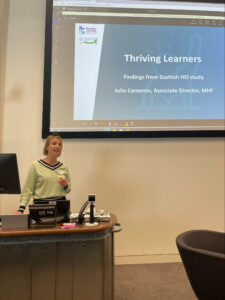
Julie Cameron of the Mental Health foundation presented how the Mental Health Foundation makes its impact through researching, developing and advocating for new and more effective policies and intervention to support and protect societal and individual mental health and well-being. Its key message is that everyone is entitled to mental health support regardless of their demographic and community. Research findings exhibited a trend that the prevalence and severity of mental health difficulties across all gender categories show a rising trend over the last decade and highlighted that minority groups such as those who identify outside of male/female gender categories were more at risk of fear of stigma, mental health difficulties and experience adverse childhood experiences. This speech reinforced that intervention research as employed by the ScotSMART working group is essential and critical to support rising needs for evidence base support on all levels ranging from individual to policy.
Panel Discussion
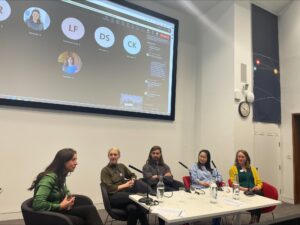
For the Panel discussion, I acted as a graduate representative for the student community and as a mental health working within student services, with current employment as a mental health mentor and ASD support worker. I was joined by specialists within their fields; Andy Shanks (Director of Student Wellbeing, University of Edinburgh), Katie Miller-Cole (Mental Health and Wellbeing Manger at Glasgow Caledonian) and Julie Cameron. Whilst this experience was very out of my comfort zone, I felt supported as a valuable contributor to the panel by my fellow panel members and the audience, which was a positive learning experience in a pursuit towards a career towards mental health intervention research. The discussion topics ranged from the differences in student mental health experiences based on level of study and international status to policy changes required to better support both staff and students needs with Scottish HEIs. Additionally, there was an early career researcher session which discussed career pathways towards mental health research, given by a panel of PhD, Postdoctoral researchers, and readers in Psychology. Alongside the Q&A session, invaluable information was provided to the audience and student research assistants on what a career in mental health research entails and the diversity of career progression opportunities which can get you there.
